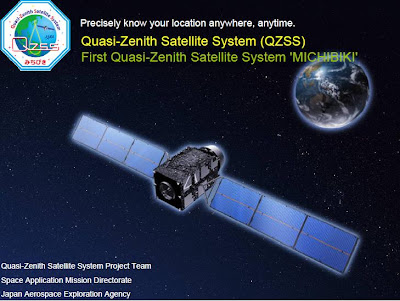 Japan is ready to implement its version of the sky spy to track, trace and database. The goal of the Quasi-Zenith Satellite "MICHIBIKI" (QZSS) is to deploy three satellites in orbit so as to always have one flying near the zenith over Japan. By doing so, the system can provide a highly accurate satellite positioning service covering close to 100% of Japan even in urban canyons and mountainous areas.
Japan is ready to implement its version of the sky spy to track, trace and database. The goal of the Quasi-Zenith Satellite "MICHIBIKI" (QZSS) is to deploy three satellites in orbit so as to always have one flying near the zenith over Japan. By doing so, the system can provide a highly accurate satellite positioning service covering close to 100% of Japan even in urban canyons and mountainous areas.If you want to read more on the QZSS, please click here or the pretty picture above.
###
Launch Result of the First Quasi-Zenith Satellite 'MICHIBIKI' by H-IIA Launch Vehicle No. 18
September 11, 2010 (JST)
Mitsubishi Heavy Industries, Ltd.
Japan Aerospace Exploration Agency (JAXA)
Mitsubishi Heavy Industries, Ltd. and the Japan Aerospace Exploration Agency (JAXA) launched the first Quasi-Zenith Satellite System "MICHIBIKI" by the H-IIA Launch Vehicle No. 18 (H-IIA F18) at 8:17:00 p.m. on September 11, 2010 (Japan Standard Time, JST) from the Tanegashima Space Center.
The launch vehicle flew smoothly, and, at about 28 minutes and 27 seconds after liftoff, the separation of the MICHIBIKI was confirmed.
We would like to express our profound appreciation for the cooperation and support of all related personnel and organizations that helped contribute to the successful launch of the H-IIA F18.
At the time of the launch, the weather was fine, a wind speed was 3.7 meters/second from the west-south-west and the temperature was 26.0 degrees Celsius.

H-IIA F18 Flight Sequence
| EVENT | ACTUAL*1 | ESTIMATED*2 |
|---|---|---|
| Lift off | 00 min 00 sec | 00 min 00 sec |
| Solid rocket boosters (SRB-A) burnout*3 | 01 min 33 sec | 01 min 38 sec |
| Solid rocket boosters (SRB-A) jettison*4 | 01 min 47 sec | 01 min 48 sec |
| Payload fairing jettison | 04 min 18 sec | 04 min 12 sec |
| First stage/Main engine cutoff (MECO) | 06 min 42 sec | 06 min 37 sec |
| First and second stages separation | 06 min 50 sec | 06 min 45 sec |
| Second stage engine first ignition (SEIG1) | 06 min 59 sec | 06 min 51 sec |
| Second stage engine first cutoff (SECO1) | 12 min 36 sec | 12 min 34 sec |
| Second stage engine second ignition (SEIG2) | 24 min 43 sec | 24 min 36 sec |
| Second stage engine second cutoff (SECO2) | 27 min 36 sec | 27 min 35 sec |
| MICHIBIKI separation | 28 min 27 sec | 28 min 25 sec |
*1 Quick report values before detailed data evaluation.
*2 The estimated values in this chart incorporate actually measured data from the engine performance tests of the F18 engines; therefore some of them may be different from the values in the Launch Plan.
*3 At the time when the combustion chamber pressure was at the maximum value of 2%.
*4 Thrust strut cutting